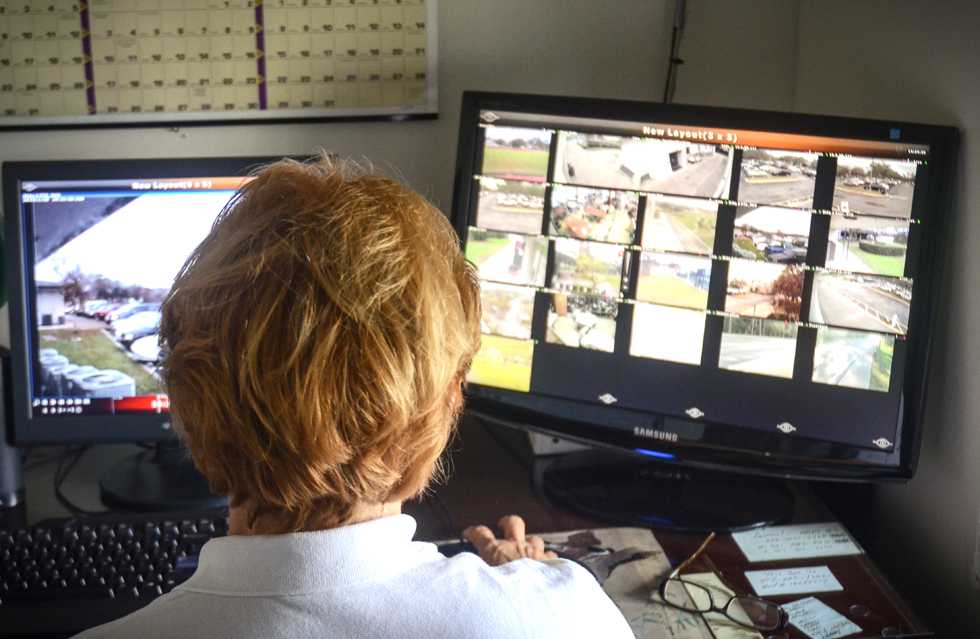On Dec. 14, an armed man entered Sandy Hook Elementary School and killed 27 people, shattering the quiet community of Newtown, Connecticut. The incident has compelled schools across the country to examine their current security protocols to determine whether such an event could happen at their school.
The school’s current security system has been assembled over the course of several years. It was organized through meetings with local law enforcement and school officials, as well as conferences that representatives from the school have attended.
The system includes cameras, guards, and a gate at the front of campus. This means that no part of campus goes unwatched for long. Guards monitor meals, supervise drop-off and pick-up, and patrol the entire campus, reporting daily to the Headmaster. They are also responsible for providing assistance in a variety of other situations.
“If a theft was reported, I would be able to track it down using the camera system,” said security officer Julio Piniero. “If I were to find drugs, say from someone’s backpack, I would take the backpack and call my supervisor and the headmaster to take it into investigation. If I caught someone on the spot, once I was absolutely positive they had drugs, I would take them to my office and call the administration. It all goes back to not wanting to jeopardize the school in any way.”
Piniero recounted an incident requiring his assistance at the opera auditions going on at the auditorium.
“I saw a woman with a walker, and she was looking troubled, so I asked her if she was okay,” he said. She said yes, but two seconds later she was flat on the ground and bleeding from the head. I called 911 and took care of the situation, and it turned out the woman had a disease causing bone fragility. Point is, we’re trained to handle situations like these if we’re there.”
The most important job for the security team is to ensure the safety of everyone at the school. The open campus sometimes makes the process of identifying unauthorized visitors difficult.
“I have to keep a constant eye on the cameras, so it would not take too long to identify an outsider,” said Pineiro. “There are twenty cameras around different parts of campus the entire day, but I particularly keep an eye on the license plate camera, outside camera, and front gate camera, since those are the places an outsider is most likely to come from. If the person comes out of the blue, or if there’s something odd about the person, then I’d approach him and start asking questions.”
Because not everything can be seen from a camera, security officers also make continuous rounds and check that all the doors and the front gate are locked. The guards have protocols to deal with anyone they encounter.
“When approaching the outsider, I’d first explain him the rules pertaining to campus outsiders,” said Pineiro. “Outsiders are regarded as trespassers, so I would then ask questions to see if he meets the criteria: if he’s a teacher, student, etcetera. If he or she became violent, then I’d defend myself and take immediate action – report them to local authorities.”
Protecting the school means responding cautiously to all suspicious events, even when they do not seem threatening.
“A man could be in a tuxedo and have a briefcase for all I care, but if he looks suspicious, whoever sees him should take the initiative to report it,” said Piniero. “Even students should be avid observers, because these situations can lead to unnecessary and regretful outcomes.”
Piniero described the steps followed when disciplinary officer Derek Wolfe reported seeing an unfamiliar man wandering around the parking lot.
“I opened my door, caught him walking on the sidewalk, and approached him. I asked him who he was, and why he was here. He replied saying that he was here for papers regarding Mr. Wilmer. The name didn’t ring a bell, but I told him that if he’s here for business on campus, he needed to sign in. We walked to the front office, and the front desk had nothing for him. She said there was no Mr. Wilmer at Trinity, period. He didn’t really say anything, but we walked out. I asked him how he got here, and he said he walked, before trailing off into some story that didn’t really make sense. By that point, I kind of reached the conclusion that there was something mentally wrong, or maybe he was disabled. He didn’t seem harmful. I escorted him out on my cart to the school’s entrance, and when we got there, he hopped off and started walking, just like that.”
Other situations are clearly harmless but must be rectified to maintain the integrity of campus security.
“A common situation is when outsiders come to fish at the back corner near the Grille. Though it’s an innocent act, these people are considered trespassers and I have had to come up to them and tell them to leave.”
Setting standards for reacting to issues makes it clear to the guards when a situation is not under control and may present a threat. In that case, they may have to contact school administration to prepare students, faculty, and anyone else on campus for possible dangers on campus.
“The number one thing is for everyone to get inside somewhere,” said upper school principal Dennis Herron.
To ensure everyone is prepared to execute a lockdown quickly, the school schedules lockdown drills alongside those for evacuation and severe weather.
A lockdown or a lockdown drill is triggered manually with a switch that can be found in the upper school principal’s office, the middle school principal’s office, and multiple other locations on campus.
Network Administrator Chad Griffith sends out an EPOP alert to all the teachers’ computers, which fills them in on the nature of the situation and allows further information to be shared.
One issue comes with managing communications between up to ten people on different parts of campus. Many of the reports are sent by text message to Herron, but during the lockdown drill in January, he tested a conference call system that would allow the administrators to communicate using their cell phones. To ensure everyone is not talking at once, Herron prompts each person to speak, and noise interference from walking around outside is an ever-present issue.
The security system is designed around the usual occurrences that would prompt school administrators to have concerns about safety. This includes crimes near campus where the suspect is missing or violent.
“We have already been routinely upgrading and improving our system,” said Herron. “After the shooting, we have had discussions about emergency procedures, and we are invested in taking the proper steps to ensure the security of our campus.”
Some of these measures include security officers and school administrators attending workshops and conferences about school security this year.
“Just like any other situation, we have to consider our infrastructure,” said Herron. “We plan to look into upgrading buildings and technology, as well as conversing with companies about new security cameras and evacuation plans. We’re also looking at a possible update to the bell system.”
The school is also considering how to best ensure students are informed about an emergency as quickly as possible.
“We’re thinking about using a blast text message system to send alerts to all constituents whose numbers we have,” said Herron. “This would allow us to send information to every student at the school, as well as any teachers that are not at their computer.”
While the school plans to examine the possibility of violence on campus, it is important to remember the odds of such an event.
“Although the incident in Connecticut is recent, such a situation is very rare,” said Herron. “In our case, it is more likely that we would get a call from the sheriff’s department and nothing would happen. Either way, we’re going to make sure the kids are safe.”





